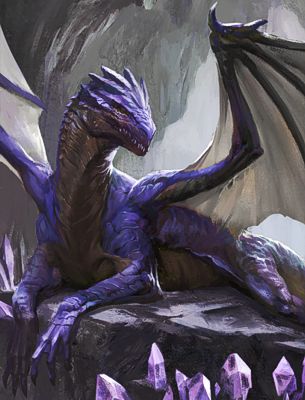

Monstrous Manual

| Climate/Terrain: | Temperate and cold mountain lakes |
|---|---|
| Frequency: | Very rare |
| Organization: | Solitary or clan |
| Activity Cycle: | Any |
| Diet: | Special |
| Intelligence: | Genius (17-18) |
| Treasure: | Special |
| Alignment: | Neutral |
| No. Appearing: | 1 (2-5) |
| Armor Class: | -4 (base) |
| Movement: | 12, Fl 40 (C), Sw 12 |
| Hit Dice: | 14 (base) |
| THAC0: | 7 (base) |
| No. of Attacks: | 3 |
| Damage/Attack: | 1-10/1-10/5-30 |
| Special Attacks: | Variable |
| Special Defenses: | Variable |
| Magic Resistance: | Variable |
| Size: | G (30’ base) |
| Morale: | Fanatic (17-18) |
| XP Value: | Variable |
Psionics Summary
| Level | Dis/Sci/Dev | Attack/Defense | Score | PSPs |
|---|---|---|---|---|
| = HD | 3/3/5 | PB,EW,PsC/M-,TS,TW | = Int | 250 |
Psychokinesis – Sciences: detonate, project force, telekinesis; Devotions: control body, inertial barrier, molecular agitation.
Psychometabolism – Sciences: complete healing, energy containment, metamorphosis; Devotions: cell adjustment, expansion, reduction.
Telepathy – Sciences: domination, mind link, mind wipe; Devotions: contact, ESP, identity penetration, truthear.
Metapsionics – Sciences: empower, psychic surgery, ultrablast; Devotions: magnify, psionic sense, psionic drain.
Most amethyst dragons prefer psychokinetic powers and many choose psychometabolism as an additional discipline.
Amethyst dragons are wise and regal, with a detached air, and ignore what they consider to be petty squabbles between good and evil, law and chaos. When hatched, amethyst dragons have lavender skin with small scales of a light, translucent purple. As they grow older, the scales gradually darken. Adults are a sparkling lavender in color.
Amethyst dragons speak their own tongue and the tongue common to all gem dragons, and 18% of hatchling amethyst dragons have an ability to communicate with any intelligent creature. The chance to possess this ability increases 5% per age category of the dragon.
Combat: Amethyst dragons prefer talking over combat. If parleying goes badly, the dragon attacks first with its breath weapon, then with psionics and spells. They never hide or attempt ambush. Amethyst dragons consider retreat dishonorable, but do so if faced with death.
Breath Weapon/Special Abilities: An amethyst dragon’s breath weapon is a faceted, violet lozenge, which it can spit into the midst of enemies, up to 75 feet away. The lozenge explodes with concussive force, causing the indicated damage to all creatures within 60’ of the impact (save vs. breath weapon for half damage). In addition, all creatures size huge and smaller must save vs. paralyzation or be knocked down. Any creature taking damage from the blast has a 50% chance of being knocked unconscious for one round per age level of the dragon, plus 1d8 rounds. An amethyst dragon casts spells and uses its magical abilities at 9th level, plus its combat modifier.
Amethyst dragons are born with an innate water breathing ability and an immunity to poisons. They are also immune to force attacks and effects, such as those from beads of force, Bigby’s hand spells, wall of force, and Otiluke’s resilient sphere. As they age, they gain the following additional powers:
Young: water walking six times a day. Juvenile: neutralize poison six times a day. Adult: shape change, as a druid, into a reptile, bird, or mammal, three times a day, with each form usable only once per day. Old: Otiluke’s resilient sphere three times a day. Very old: reflecting pool once a day. Venerable: control weather once a day.
Habitat/Society: Amethyst dragons live on the shores of isolated mountain lakes and pools, some in caves beneath the water. They are good parents, but believe their young should fend for themselves as soon as they become young adults. Amethyst dragons dislike red and white dragons, and consider silver and copper dragons to be foolish.
Ecology: Amethyst dragons prefer to eat fish and a large number of gems. They are not inherently enemies with any life form.
| Age | Body Lgt. (’) | Tail Lgt. (’) | AC | Breath Weapon | Spells W/P | MR | Treas. Type | XP Value |
|---|---|---|---|---|---|---|---|---|
| 1 Hatchling | 2-10 | 4-10 | -1 | 2d8+1 | Nil | Nil | Nil | 4,000 |
| 2 Very young | 10-18 | 10-16 | -2 | 4d8+2 | Nil | Nil | Nil | 6,000 |
| 3 Young | 18-28 | 16-26 | -3 | 6d8+3 | Nil | Nil | Nil | 7,000 |
| 4 Juvenile | 28-38 | 26-36 | -4 | 8d8+4 | Nil/1 | Nil | H,U,T | 9,000 |
| 5 Young adult | 38-53 | 36-46 | -5 | 10d8+5 | 1/1 | 25% | H,U×2,T | 10,000 |
| 6 Adult | 53-68 | 46-56 | -6 | 12d8+6 | 1/2 1 | 30% | H,U×3,T×2 | 12,000 |
| 7 Mature adult | 68-80 | 56-66 | -7 | 14d8+7 | 1 1/2 1 1 | 35% | H,U×4,T×2 | 13,000 |
| 8 Old | 80-92 | 66-76 | -8 | 16d8+8 | 2 1/2 2 1 1 | 40% | H,U×6,T×3 | 15,000 |
| 9 Very old | 92-102 | 76-82 | -9 | 18d8+9 | 2 1 1/2 2 2 1 1 | 45% | H,U×8,T×3 | 17,000 |
| 10 Venerable | 102-112 | 82-88 | -10 | 20d8+10 | 2 2 1 1/2 2 2 2 1 1 | 50% | H,U×10,T×4 | 19,000 |
| 11 Wyrm | 112-122 | 88-94 | -11 | 22d8+11 | 2 2 2 2 1/2 2 2 2 2 1 | 55% | H,U×13,T×4 | 20,000 |
| 12 Great wyrm | 122-132 | 94-100 | -12 | 24d8+12 | 2 2 2 2 2 2/2 2 2 2 2 2 | 60% | H,U×16,T×5 | 21,000 |
